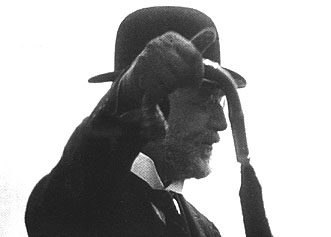
I admit that most people have not heard of Erik Satie, and have not heard much of his music. He has at least one piece that everyone has heard, whether they recognize it as Satie or not (Gymnopedie #3). It's like that horrid Canon that everyone plays at their wedding. In any case...
Eric Satie was born in 1866, and later changed his first name to Erik. He was trained at various musical academies in France, but he did not work well with his teachers. As a direct result of this, none of his compositions bear the mark of conservatory training.
When Satie was in his 20s he became sick with bronchitus (which he got deliberately
to get out of his army service) and became a full fledged bohemian. He became
best friends with Debussy while playing the piano in a caberet in Paris. Satie
influenced Debussy, and kept him away from the Wagnerian influences that were
omnipresent in music at the time.
Satie's view of Wagner and his leitmotifs was summed up in the following comment:
"There is no need for the orchestra to grimace when a character comes on stage...
What we have to do is create musical scenery...in which the characters move and talk."
Over several years Satie established himself as *the* bohemian, and then suddenly dropped out of the musical scene. No one heard of him for almost 12 years, when he decided he still had musical statements he wanted to make, and re-entered musical arena.
Ravel had been a student of Debussy over 15 years earlier, and when Satie make his "come back", both Ravel and Debussy wanted to claim Satie as their own discovery. There was some strain on the relationships between Satie and his old friends, and fell out with Debussy. They never again became good friends. Towards the end of Debussy's life Satie wrote a letter to Debussy, who was quite ill. The letter was angry in tone, and quite upset Debussy. Later in his life, Satie would never forgive himself for hurting his old friend Debussy when he was sick.
As Satie started composing again, he became an inspiration to new composers in France. Several of this new generation of composers would become known as "Les Six", or "the six". Satie's new fame as the "godfather" of "les six" hung well upon his shoulders, and he continued to compose avant-guarde music. Milhaud, one of "les six" commented "The art of Erik Satie was a veritable Renaissance...During all that time he was content to sniff out a movement, to indicate a direction; then he stepped back, leaving to others the task of committing all their strength along the path he had indicated."
Satie was writing music that was bringing him fame and notoriety. His pieces were
so different from each other that people started to be confused and decided
they didn't like his music.
This leads up to one of my favourite quotes, Satie or non-Satie:
"Those who do not understand are requested to assume an attitude
of submissiveness and inferiority".
Love him or hate him for it, but Satie actually invented "muzak" or background music. He called it "furniture music" and premiered it at the intermission of one of his performances. People stopped to listen to the music, and he ran around the room saying "Talk, keep talking! And move around. Whatever you do, don't listen!"
Later on he explained in writing wexactly what he wanted from "Furniture music":
We want to establish a music designed to satisfy "useful" needs. Art has no part
in such needs. Furniture music creates a vibration; is has no other goal; it fills the
same role as light and heat - as comfort in every form...Furniture music for
law offices, abnks, etc. No marriage ceremony complete without
furniture music...Do not enter a house which does not have furniture music".
In 1924, Satie wrote his final piece; a ballet. At the first performance of this ballet,
the curtain bore a sign reading: "Erik Satie is the greateds musician in the world;
whoever disagrees with this notion will please leave the hall".
Shortly after this premiere, and after four decades of heavy drinking, Satie
became ill with cirrhosis of the liver. He died several months later. His compositions
are not often heard in today's concert halls, but there is no one that can
claim that he did not leave a direct and indelible mark upon the music of the
twentieth century.
There is tons more about Satie that could keep one writing all day long. Only one of his pieces is mentioned here. I don't know why I decided to put this page here. I just really love Satie; both his wit and his music. There isn't a whole lot out there for people to learn about him. If anyone has any questions or comments about Satie or any other composer for that matter feel free to ask or discuss with me. I don't claim to be an expert on all composers, but there always has to be a starting ground with every composer and musician, and I have that.
